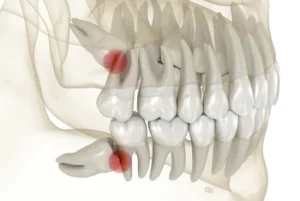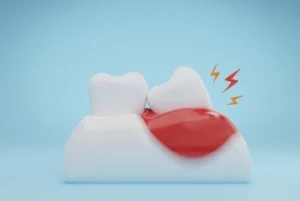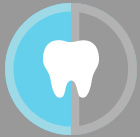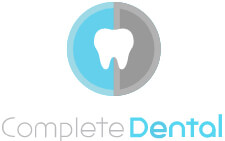It’s common to experience some changes in your breath after wisdom teeth removal, especially in the first few days of the healing process. While most cases are temporary and part of the body’s normal response to tooth extraction, persistent bad breath after wisdom tooth extraction can sometimes indicate an underlying issue that needs attention. Knowing the reasons behind it and the steps you can take to manage it will help you keep your mouth healthy, support healing, and maintain good oral hygiene.
Why Bad Breath Happens After Wisdom Teeth Removal
Bad breath after wisdom teeth extraction is usually caused by a combination of natural healing responses and changes in your oral environment. Here are the most common reasons:
 Formation of the Blood Clot
Formation of the Blood Clot
After wisdom teeth removal surgery, a blood clot naturally forms in the extraction site to shield the exposed bone and nerves while aiding the healing process. Although this clot is vital for recovery, it may sometimes lead to a temporary unpleasant odour as new tissue begins to grow. If the clot becomes dislodged, however, it may lead to a painful complication known as dry socket, which is often accompanied by foul-smelling gases and an unpleasant taste in the mouth.
Accumulation of Food Particles
During the early stages of recovery, food particles can easily get lodged in the extraction site, especially if you’re eating soft foods that cling to healing tissues. These trapped food particles can lead to bacterial growth, resulting in an unpleasant odour and bad breath.
Reduced Saliva Production
Saliva is paramount for good oral health as it helps rinse away bacteria and neutralise harmful acids. After surgery, you might experience dry mouth due to medications, reduced fluid intake, or simply from breathing through your mouth more often. This decrease in saliva production weakens the mouth’s natural defence, allowing bacteria to multiply and produce foul smells.
Common Causes of Persistent Bad Breath After Wisdom Teeth Extraction
While mild bad breath is usually temporary, persistent bad breath more than a week after your wisdom teeth have been removed might be a sign of an underlying issue.
Dry Socket
If the blood clot at the extraction site breaks down or becomes dislodged, it can leave the underlying bone and nerve exposed. This painful condition not only delays healing but can also produce a foul-smelling discharge and intense bad breath. Severe pain and an unpleasant odour are strong indicators that you should seek professional advice.
Bacterial Infections
Poor oral hygiene during recovery can allow bacteria to thrive around the extraction site. Infections can cause foul-smelling gases, swelling, and even a bad taste in the mouth. If you notice these symptoms, along with persistent bad breath, consult your dentist for professional advice.
Trapped Debris and Food Particles
Trapped food particles and debris around the extraction site can linger and lead to bacterial growth if not properly cleaned. Even with good oral hygiene, small particles might remain lodged, leading to ongoing bad breath.
How to Maintain Good Oral Hygiene During the Healing Process
Maintaining oral hygiene is essential to prevent bad breath and support proper healing. Here are some effective strategies to keep your mouth healthy:
Rinse Gently with Salt Water
Rinsing your mouth gently with warm salt water helps remove food debris, reduce bacterial buildup, and keep the extraction site clean. Be careful not to swish too forcefully, as this could dislodge the protective blood clot.
Brush Teeth Gently
Use a soft-bristle toothbrush to clean your teeth gently without irritating the extraction site. Be careful around the area where the blood clot forms, as disturbing it can lead to complications like dry socket.
Use a Tongue Scraper
A tongue scraper can remove bacteria and debris that cause bad breath. Incorporating it into your routine helps maintain fresh breath and reduces the risk of persistent bad breath after wisdom teeth extraction.
Stay Hydrated and Stimulate Saliva Production
Staying well-hydrated by consuming enough water throughout the day can help prevent dry mouth and rinse away bacteria. Additionally, chewing sugar-free gum can boost saliva production, enhancing your mouth’s natural defence against bad breath.
Lifestyle Tips to Keep Your Breath Fresh After Surgery
 Apart from oral hygiene practices, simple lifestyle choices can significantly improve your breath after wisdom teeth removal.
Apart from oral hygiene practices, simple lifestyle choices can significantly improve your breath after wisdom teeth removal.
- Stick to soft foods: Opt for soft foods that are easy to chew and less likely to become lodged around the extraction site.
- Avoid smoking and alcohol: These can dry out your mouth and slow down healing, contributing to bad breath.
- Limit sugary foods: Sugar feeds bacteria that produce foul smells and can lead to further oral health problems.
- Avoid excessive mouth breathing: Try to breathe through your nose when possible to prevent your mouth from drying out.
When to Seek Professional Advice
Bad breath is often a normal part of the healing process, but certain signs indicate that you should seek professional advice. If your breath smells foul and bad breath persists for more than a week, or if you notice severe pain, foul smelling discharge, or other unusual symptoms, contact your dentist. These could be signs of dry socket, infection, or other complications that require treatment.
Supporting Proper Healing for a Healthy Mouth
Recovering from wisdom teeth removal normally takes time, but most people notice improvements in breath and oral comfort as healing progresses. By following your dentist’s instructions, maintaining oral hygiene, and paying attention to any changes in your breath, you can support proper healing and prevent complications. Address bad breath early, and you’ll soon enjoy fresh breath and a healthy smile once your mouth heals fully.
Bad breath after wisdom tooth extraction is usually temporary and manageable. With consistent care, attention to oral hygiene, and regular rinsing, you can prevent unpleasant odours and ensure a smooth recovery. If persistent bad breath or other concerning symptoms arise, don’t hesitate to seek professional advice for a thorough examination and appropriate treatment. Contact Complete Dental today to book a consultation with our local dental clinic in Coorparoo.
Contact Coorparoo: 07 3801 6503
Contact Elanora: 07 5235 8199
Note: Any surgical or invasive procedure carries risks. Before proceeding, you should seek a second opinion from an appropriately qualified health practitioner.
References
Mayo Clinic. (n.d.). Dry mouth: Symptoms and causes. Retrieved from https://www.mayoclinic.org/diseases-conditions/dry-mouth/symptoms-causes/syc-20356048
Cleveland Clinic. (n.d.). Dry socket. Retrieved from https://my.clevelandclinic.org/health/diseases/17731-dry-socket
WebMD. (n.d.). Bad breath: Causes, treatments, and prevention. Retrieved from https://www.webmd.com/oral-health/bad-breath









